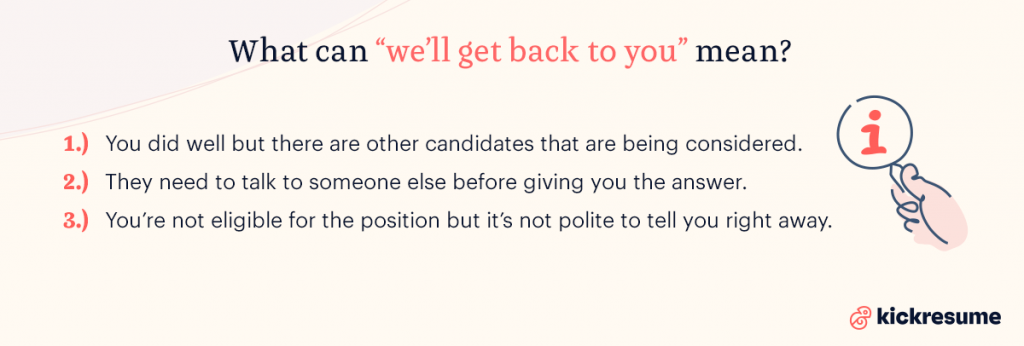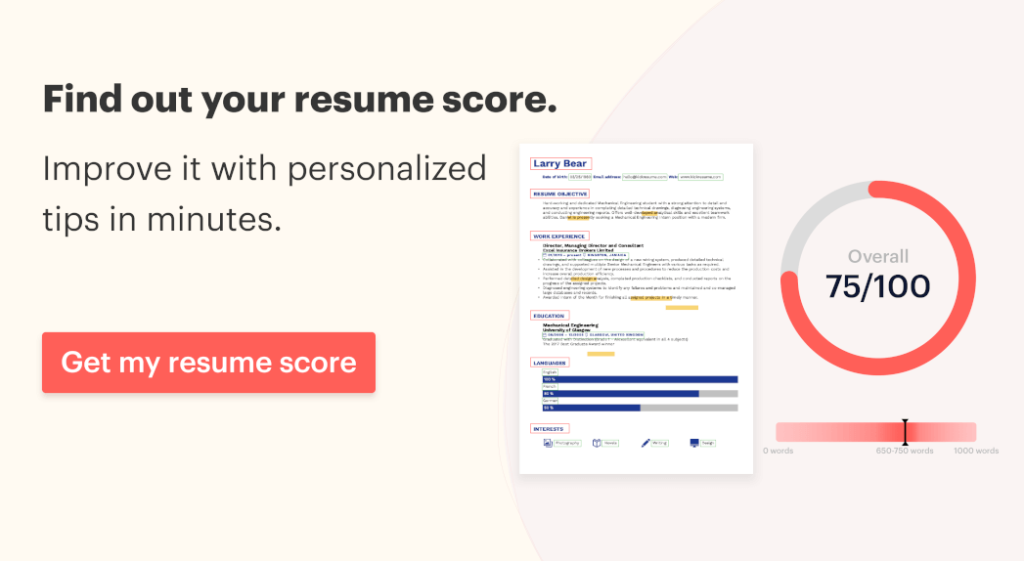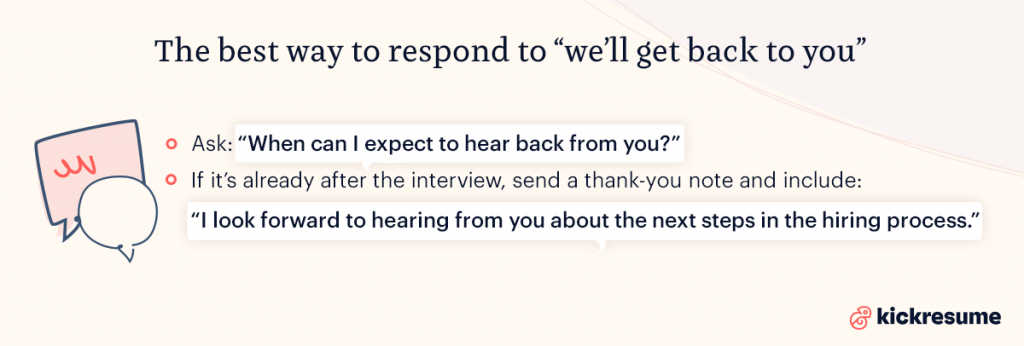Most of us have heard this cliché phrase from HR managers at least once after a job interview. The question is, what do these words even mean and how should you respond to “we'll get back to you”?
The ideal solution is to write the perfect “thank-you note” after the interview. Here, you can ask about the timeline of their recruitment process and show your lasting interest in the job.
Alternatively, you can even avoid it altogether while still at the interview.
We'll tell you how, plus we'll share some more tips on what to do when you hear this infamous sentence and what it actually means.
- What does “we’ll get back to you” mean?
- Why do recruiters say this phrase?
- How can you prevent the situation in the first place?
- The best way to respond to “we’ll get back to you”
- Thank you email template
- Follow up email template
- Job interview process: Insights from recent statistics
- How to handle rejection (with email template)
- Don’t let one “we’ll get back to you” ruin your week
What does “we’ll get back to you” mean?
After hearing this phrase, many of us get confused and all we're left with is overanalyzing every single detail of the interview.
What was the body language of the recruiter? Have they smiled at the end? Should I thank them after the interview?
First and foremost, while it may feel like a bad sign when you hear these words, in fact, that isn't the truth. This ambiguous answer doesn't automatically mean that you're rejected.
On the other hand, it also doesn't mean that you've been selected.
Here's what “we will get back to you” can signal:
- “There are some other candidates we need to consider. If they aren't as qualified or as experienced as you then we will get back to you.”
- “I don’t have the answer right now. I need to talk to someone before giving you the answer. Only then will I get back to you.”
- “Unfortunately, you’re not quite eligible for this position. Still, I won’t say anything right now because it’s not good manners to say so. That’s why I need to use: I will get back to you.”
As you can see, there’s no need to despair. Unless your situation fits scenario number 3, there's still hope!
And “we will get back to you” doesn't symbolize the end of your job prospects.
On the contrary, it can as well be the next step towards getting you a job.

Why do recruiters say this phrase?
You may wonder why is this sentence still so popular, even if became such a notoriously overused and mocked cliché.
Well, it’s because the process of recruiting in many larger companies is usually quite long and complicated. And the final decision about who's going to be hired doesn't lie only on the recruiter's shoulders.
The HR department needs to communicate not only with you and other candidates but also with your future employer in order to come up with the result of the hiring process.
That's why they give such an ambiguous answer — the decision is probably still up in the air and the hiring manager is buying time.
So — try to be patient and understanding.

How can you prevent the situation in the first place?
You can always get a step ahead of the recruiter and try to squeeze a more concrete answer out of them.
The wisest thing is to ask about the next steps and the decision timeline before you leave the interview.
Try to get an exact date or date range from the interviewer. Ask directly: “When can I expect to hear back from you?”
This will put your mind to rest by giving you an idea of when you can expect to hear something.
It'll also give you a timeframe for following up appropriately without getting too pushy.
The best way to respond to “we’ll get back to you”
If it's already after the interview and you've heard or received these infamous words, here's what you should do next:
1. Send a thank-you note
The first thing you should always do after an interview is to send a thank-you note within 24 hours of your interview.
Why?
- it's a nice thing to do
- it's a great chance for you to ask when they'll get back to you
- you'll leave a positive impression
You can try this simple thank-you email template:
2. Follow up
If you’re waiting for a response for a longer time, sometimes the best step to take is to be bold and proactive. In short — follow up.
When is it okay to do so?
You can follow up with them if it's more than 7-10 days from your interview.
Or, if they provided an expected date for feedback after the interview, follow up one business day after that date has passed.
Contact the HR department and let them know about your continuing interest in the position and that you're eager to hear back. Without being too pushy, ask what the status of the position is.
You can try writing an email such as this one:
Be prepared to get no clear response as they may not be able to address this. However, they may be able to provide you with a progress update or ask for more information from you.
It’s also a good idea to connect with employers at your prospective organization via LinkedIn or other social networks to see if you can learn more through networking.
3. Show dedication — but in moderation
Yes, it’s important to follow up and stay on the company’s radar. But be careful and don’t overdo it!
- Feel free to call for a status update, but be consistent with just one method of communication. Calling, emailing, and texting at the same time — can send the wrong message and put the recruiter off for good.
- If you want to use voicemail, leave a short, courteous message to keep things professional. But then you have to stay patient and not spam the recruiter with more follow-ups.
- You also need to stay realistic. If it’s been over a month since you’ve heard anything, there’s no point in beating a dead horse. It’s time to move on.
The truth is that you have no control over the recruiting process and the entire situation is in someone else’s hands. But don’t let this cripple an otherwise successful job search.
Take the time you need, shed your frustration, and move on to the next opportunity. It might be waiting just around the corner!
4. Be patient
Remember that the lukewarm response doesn’t always equal rejection. Accept the fact that some information can’t be shared right away.
The company needs to fill the position but their timeline is often much looser than yours.
You may be the winner, but they still need to wait to make an official offer due to the final approval or some bureaucratic jungle.
In these cases, the best course of action is to wait it out for at least a week.

Job interview process: Insights from recent statistics
As you step into the job market, it's crucial to have realistic expectations about the interview process.
We've uncovered three key statistics that will not only help you set these expectations but also guide you in preparing effectively for your job search:
#1 Average length of the interview process
The duration of the interview process can significantly vary depending on the job role.
According to recent US job interview statistics, some positions, like waiters and retail representatives, experience a swift hiring process, averaging around 8 to 8.6 days.
In contrast, more specialized roles such as business systems analysts and research scientists often undergo a lengthier process, with average durations stretching to approximately 44.6 to 44.8 days.
#2 Average response time post-interview
Post-interview anxiety is common, partly due to the uncertainty surrounding the response time from potential employers.
On average, candidates can expect a response within 24 business days.
However, this timeframe is subject to variation across different industries. For example, candidates applying for roles in the hospitality and recreation sector might experience longer waiting periods, with an average response time of 39.5 days.
In contrast, government roles are typically quicker to respond, taking around 16 days on average, according to recent HR statistics.
Being aware of these differences can help you manage your expectations and plan follow-up communications more strategically.
#3 Duration of job interviews – A sign it didn't go well?
The length of a job interview can provide subtle clues about its success.
On average, a job interview lasts between 30 to 45 minutes, based on recent US job interview statistics.
Interviews that wrap up in less than 20 minutes might indicate that things didn't go as well as hoped.
And if you have a gut feeling you may not hear back, these are more signs you didn't get the job.
Understanding these insights can assist you as a job seeker in setting realistic expectations and preparing accordingly.
How to handle rejection (with email template)
Okay, the promised "we'll get back to you" finally arrived. And the news wasn't what you hoped for - you didn't get the job.
While it's natural to feel a mix of emotions, this moment can be a turning point in your job search journey.
Explore three strategies to transform a negative response into a positive experience, helping you move closer to your career goals.
Here are some effective ways to handle job rejection:
- Don't be petty. It's crucial to handle rejection gracefully. Avoid expressing frustration or negativity, as it could harm your professional reputation. Remember, the world is small, and you never know when your paths might cross with the interviewer or company again.
- Request constructive feedback. Reach out to the interviewer or hiring manager politely to ask for feedback. This shows your willingness to learn and grow professionally, and the insights you gain can be invaluable for future interviews.
- Maintain professional relationships. Always thank the interviewers for their time and the opportunity. A gracious and professional response can leave a lasting positive impression, keeping the door open for future opportunities at the company.
Email template for seeking feedback post-rejection
Don’t let one “we’ll get back to you” ruin your week
Waiting is the worst, I know. You're all stressed out, your spirits are low and you have no clue what may be happening in the meantime.
You may be fixated on this one position and have no energy to seek other job opportunities. But that’s actually the worst thing that you can do.
Don’t put your search on hold. Keep trying and pushing forward.
Success never comes easy, and definitely not to those who do nothing but wait around for the phone to ring.
So, don’t let one “we’ll get back to you…” ruin your week.
Stay busy, and proactive, and you'll see that the right opportunity will come through one day!
FAQ: How to respond to "we’ll get back to you"
- How can you tell if a “we’ll get back to you” after an interview was a positive sign?
You may expect a positive outcome when:
- the interview lasted for longer than it was scheduled
- the recruiter listened actively
- the recruiter used language that indicated your future position in the company (“once you work here…”)
- the interview felt like a chat and not like a stressful official conversation - How can you tell if a “we’ll get back to you” after an interview was a negative sign?
You may expect a negative outcome when:
- there was little eye contact with the interviewer
- the interviewer was distracted
- the interview lasted only a few minutes - When should you follow up after an interview if you didn't hear back?
After sending a thank you message after the interview (which you should always do), wait for at least one week before reaching out again. Recruiting takes a while so keeping that in mind will help you to remain reasonably patient.
This article was recently updated. The original article was written by Jakub Kaprál in 2018.



